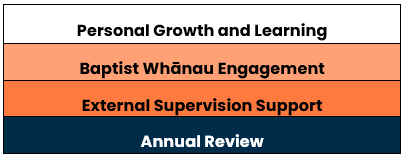What is the Registration Development Agreement?

Baptist Registration is a formal endorsement by the Baptist Union of New Zealand. As a registrant, it signifies your commitment to the ongoing development of your character, knowledge, and ministry abilities, and your willingness to uphold the distinctives and values of NZ Baptists.
Your Registration Development Agreement (RDA) affirms this commitment and is central to your Baptist Registration application. It must be prayerfully and thoughtfully planned in collaboration with the person you’ve nominated to conduct your annual RDA review and this is recommended to take place in October each year.
This planning must align with the requirements of the Baptist Union of New Zealand.
Your RDA includes four key areas :

You will be required to submit your planned RDA through Carey Centre for Lifelong Learning during the application process for Baptist Registration.
Tip: Share this section with your nominated reviewer to help plan your RDA effectively.
(1) Personal Growth and Learning
Ministry leadership is one of the most demanding callings — it requires a unique mix of theological, relational, organisational, and spiritual strength. To lead well and grow sustainably, ongoing learning is essential.
The Baptist Union of New Zealand encourages lifelong learning beyond the minimum requirements for Baptist Registration, and the Carey Centre for Lifelong Learning is here to support you in that journey.
What is required and how many learning hours do I need to commit to ?
As part of your RDA you must complete a set number of learning hours each year — with at least 2 of those hours coming from Priority Learning . The number of hours required, is dependent on the hours your are serving in ministry for (Paid / Unpaid)
| Monthly Ministry Hours | Minimum Learning Required |
| 120 hours or more per month | ✅ 24 hours of learning (approx. 3 days) 📌 Includes at least 2 hours of Priority Learning |
| 80–119 hours per month | ✅ 16 hours of learning (approx. 2 days) 📌 Includes at least 2 hours of Priority Learning |
| 40–79 hours per month | ✅ 8 hours of learning (approx. 1 day) 📌 Includes at least 2 hours of Priority Learning |
Note: Priority Learning hours are part of your total — not additional. These are selected from options provided annually by the Baptist Support Centre.
What learning activities are acceptable for an RDA?
Any activity that helps sustain, support, and grow your ministry role. These activities must align with the learning outcomes you develop in partnership with your annual RDA reviewer.
Some examples of activities:
- Retreats (note: must not exceed 1/3 of your total learning hours)
- Conferences (in-person or online)
- Carey webinars or courses
- NZQA-accredited study
- Self-directed learning (e.g. books, articles, videos, workshops)
- Sabbaticals
- Ministry or leadership training courses
Tip: For self-directed learning like books, as a general guide, 1 book = up to 6 hours of learning (e.g. reading 2 books = up to 12 hours).
What is Priority Learning ? What is this year's option?
Each year, the Baptist Support Centre’s Leadership Coordination Office releases a set of Priority Learning options. These are focused learning topics considered especially important for the Baptist movement at that time and are set by the National Support Office.
- You must complete at least 2 hours of Priority Learning annually.
- These are usually delivered as in-house webinars
For 2026, the designated Priority Learning is:

“Leading from a Healthy Place: Cultivating Sustainable Leadership through Self-Care”
Self-care is important for leaders because it sustains their spiritual, emotional, and physical health, enabling them to lead others with wisdom, compassion, and endurance.
This 2 hour course will be comprised of three components:
(1) A presentation on the importance of the spiritual, emotional and mental, physical and relational and social self-care for the pastor/leader
(2) An audit that enables the leader to assess their current level of well-being.
(3) A tool to construct a healthy self-care plan going forward.
What are learning outcomes?
Learning outcomes describe what you aim to learn and apply in your ministry. These are distinct from learning activities, which are the methods or steps you take to achieve those outcomes – the how
This difference is demonstrated in the table below :
| Learning Outcome (The “What”) | Activities (The “How”) |
| To be able to implement a new system and processes for improved pastoral care in my congregation. | • Attending “Designing pastoral care plans for your church” webinar with Phil Halstead (3hrs) • Read Strategic Pastoral Counselling by David G. Benner • Read Foundations of Pastoral Care – Bruce L. Petersen • Attend a two-day Ministries of Pastoral Care Workshop. |
| To be able to improve the ways that our young people engage with the Bible and are discipled. | • Participating in the Building a Discipling Culture programme (led by Crossway Baptist, Melbourne) • Reading the Fuller Youth Institute’s latest book, Faith Beyond Youth Group, and discuss with our youth leadership team • Attend the Intergenerate Conference – looking at how to be a church on an intergenerational journey |
Effective learning outcomes should be:
- Specific
- Achievable
- Relevant
- Reviewable (Measurable)
We recommend that learning outcomes be discussed and planned during the Annual Review of the RDA with your reviewer. These outcomes may align with the broader direction of your church or organisation for the year ahead.
As part of approving applications, there is an expectation that learning outcomes are clearly connected to the learning activities listed in the RDA.
The Annual Review of RDA Tool may assist in completing a full and thorough RDA review, and provides a useful format for constructing your learning outcomes
(2) Baptist Whānau Engagement
This engagement aligns to the value of associating together as a collective of faith communities seeking to bring gospel renewal to people and places.
The Baptist Whānau Engagement requirements are dependent on the hours you are in ministry for (Paid / Unpaid) and the category of registration you are applying under. To help you determine what’s required for your situation, the following may assist.
Click on the tab for the category you are applying for registration under. Each tab shows the requirements for this specific category
- Pastoral Category
- Chaplaincy Category
- Baptist Entity Category
- Kaiarahi Māori Category
- Ministry / Mission Category
| Category | Ministry Hours (Paid / Unpaid) | Requirements |
| Pastoral | 120 hours or more per month | – Attend 70% of Baptist cluster meetings – Attend at least one Baptist Whānau event from: 1. National Hui 2. Regional Hui 3. Hanmer Retreat 4. KB Weekend 5. Other Baptist Event (details must be provided) |
| Pastoral | Less than 120 hours per month | – Attend one of the following: 1. National Hui 2. Regional Hui 3. 70% of Baptist Cluster meetings 4. Hanmer Retreat 5. QB Weekend 6. Other Baptist Event (details must be provided) |
|
Category |
Ministry Hours (Paid / Unpaid) |
Requirements |
|
Chaplaincy |
120 hours or more per month |
– Attend 70% of Baptist cluster meetings |
|
Chaplaincy |
Less than 120 hours per month |
– Attend one of the following: |
|
Category |
Ministry Hours (Paid / Unpaid) |
Requirements |
|
Baptist Entity |
120 hours or more per month |
– Attend any two of the following Baptist Whānau events: |
|
Baptist Entity |
Less than 120 hours per month |
– Attend any one of the following Baptist Whānau events: |
|
Category |
Ministry Hours (Paid / Unpaid) |
Requirements |
|
Kaiarahi Māori |
120 hours or more per month |
I need to attend any two of the following Baptist Whānau events: |
|
Kaiarahi Māori |
Less than 120 hours per month |
I need to attend any one of the following Baptist Whānau events: |
|
Category |
Ministry Hours (Paid / Unpaid) |
Requirements |
|
Ministry / Mission |
120 hours or more per month |
I need to attend any two of the following Baptist Whānau events: |
|
Ministry / Mission |
Less than 120 hours per month |
I need to attend any one of the following Baptist Whānau events: |
(3) External Supervision Support
External Supervision provides regular space to reflect on your ministry, review decisions, explore challenges, and continue growing. It is a purposeful conversation with your supervisor that supports your personal and professional development, while helping you maintain healthy, ethical, and safe ministry practices.
It is a requirement of Baptist Registration that all registrants engage in supervision with an approved supervisor listed on the Supervisor Directory , except for those applying under the Baptist Entity category. For more information on selecting an Approved External Supervisor, see here.
In exceptional cases, registrants may request an exception to this policy by submitting a written application using the exception request form, available upon request at lifelonglearning@carey.ac.nz. This must be completed before applying for Baptist Registration.
External Supervision Support RDA Requirement
If you are in ministry (paid / unpaid) 120 or more hours per month you are required to have at least bi-monthly supervision (i.e. minimum six times per year).
If you are in ministry (paid / unpaid) 40-119 per month you are required to meet with a supervisor a minimum of three times per year.
If you are registering under the Baptist Entity category, you are not required to have supervision.
What are the 4 aims of Baptist Supervision ?
To support practitioner professional development
Supporting and encouraging you, as registrant, in your development of insight, knowledge, and skills beneficial to your vocational context.
Reflecting on learning and learning experiences, by you as a registrant, as well as identified learning outcomes related to your Registration Development Agreement.
To support practitioner wellbeing
Ensuring that supervision covers your wholistic well-being; mental, emotional, physical, spiritual, relational.
Ensuring that there is reflection on your ministry/life balance, stress levels, ‘sabbath’, recreation, replenishing activities, holidays/leave.
To support practitioner safe and ethical practice
Supporting and encouraging awareness of ‘best practice’ for wellbeing and safeguarding of others, your organisation, and your wider community related to your ministry and influence.
Supporting and encouraging healthy boundaries related to your personal and vocational context; relational, sexual, ethical, moral, and legal boundaries.
To support practitioner reflective learning
Supporting you to reflect “on practice” in the context of supervision to benefit your ministry “in practice”.
(4) Annual Review of your RDA
The Annual review is an integral part of the Registration Development Agreement (RDA). This is to be conducted by the reviewer you nominated in your previous RDA and is a 2 part process :
(1) considering progress against your current RDA (i.e. what has worked well, what has been less effective and what needs to happen)… and
(2) identifying learnin outcomes and activities to be undertaken for Personal Growth and Learning, Baptist Whānau Engagement and External Supervision Support , for the upcoming registration period. (what is the plan ahead?)
When applying for Baptist Registration, you will be required to confirm that your annual review has taken place and the Carey Centre for Lifelong Learning will contact a random selection of reviewers each year for feedback.
A useful tool to use in the Annual Review can be found on our resources page